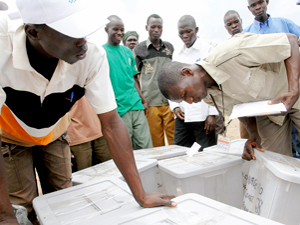
KHARTOUM, Sudan (FinalCall.com) – The first multiparty elections in over two decades in Africa’s largest country will go ahead as planned despite the withdrawal of several opposition parties citing campaign irregularities.
Presidential and legislative elections kicked off nationwide here as more than 16 million voters were scheduled to go to 120 voting centers across this vast nation and choose the candidate of their choice for president.
Holding a press conference at the Friendship Palace in Khartoum National Election Commission chairman Abel Alier April 10 officially announced the start of polling.
“For the last 56 days of the electoral process, we were watching and you were watching political parties and candidates campaigning for these various offices, and that campaign ended yesterday. And today, there is a break tomorrow, we will start the last part of the elections process that is polling and the polling will take three days,” he said. The original election days were April 11-13, but two days have been added.
The consensus, according to Khaill Yusef, is that in the main race, “President Bashir is a long way ahead.” Mr. Yusef, who is originally from London and whose parents came from the Caribbean, said over dinner that programs President Bashir “achieved since coming into power has put him a long way ahead.” “Whether its oil, his educational programs, the infrastructure … that he’s fought hard to get people what they need means he is the front runner,” said the former BBC correspondent and current schoolteacher in Khartoum.
In addition, an International Criminal Court indictment has actually helped the current leader of the Islamic government, Mr. Yusef added. “The ICC has been a positive for the president. After the indictment the president flew in the face of them and went to about five or six countries around the world.” Though people might not have supported his presidency before the indictment on charges of genocide in Sudan’s Darfur region, President Bashir gained major support when he was targeted, said Mr. Yusef.
“They didn’t necessarily support him as a person, but his office and the sovereignty of Sudan was challenged by the fact that the president was indicted. So whether the people supported the opposition or not he got a lot of support,” explained the onetime journalist.
While discussing the relations between Northern and Southern Sudan, Mr. Yusef said, “The relationship between the North and South since independence has been pretty icy.” Many people blamed the country’s former colonizer Great Britain, which “closed areas” and prevented Northerners and Southerners from crossing into each other’s territory, he continued. Still when the South votes on a succession referendum next year, Mr. Yusef believes the region composed mainly of Christians and animists will vote to “go their own way.” And, he added, there is “a growing movement in the North that feels that the South should go their own way.”
What will the election outcome bring? “Too hard to say what will finally occur. But I think President Bashir will be reelected, they’ll be a power sharing, or some kind of agreement made between political parties,” said Mr. Yusef. He came to Sudan 13 years ago to study Islam in an African setting and decided to stay.
There is already an agreement that assures Northern Sudan partial control of Sudan’s vast oil reserves and so long as the deal between Northern Sudan and a semi-autonomous Southern Sudan holds over the region of Abeyi, President Bashir probably won’t contest a division of Sudan, he said.
The election follows a civil war in the Sudan where the mainly Muslim North and the largely Christian and Animist South have been at odds. The elections and a referendum on autonomy for the South aim to end the divisions in the country–and prevent a major breakdown of the largest nation in Africa based on land mass.
The Sudan Tribune reported April 10, the former U.S. President Jimmy Carter met with election officials as his Carter Center joined the United Nations, the African Union and others in election monitoring.
President Carter met with President Bashir and says he was promised that transportation of election materials to polling stations would not be delayed.
“I hope that it will be completely compatible with international standards and safe and free and fair and that the decision of individual voters will be expressed freely without intimidation,” said President Carter, according to the Sudan Tribune.
Mr. Carter said the next day, “voting materials ‘may get there a bit late, but they will have three days at least in which to vote,’ ” the Sudan Tribune said. The Umma Party and the “SPLM North Sudan sector as well as other small political forces. They say the electoral process is marred by irregularities and fraud,” said the newspaper. “The deputy chairman of the electoral board, Abdallah Ahmed Abdallah, admitted the existence of such irregularities saying ‘We know there is no perfect election in the world, this is not an exception.’
“These elections will not suddenly transform Sudan into a democratic society. That will take time and experience,” he added.”
The South-ruling SPLM, the main opposition party, is participating in the election, but has complained about what it called fraud that favors the current president. Reports of problems were lodged the fi rst day, but Sudanese offi cials extended voting an additional two days and polls will offi cially close on the evening of April 15.












